Matangi Devi: How to Master Art, Music, and Speech
Exploring Matangi Devi: The Tantric Goddess of Wisdom, Art, and Creative Mastery
Matangi Devi: The Goddess of Wisdom, Knowledge, and Art in the Dasha Maha Vidyas
Matangi Devi, revered as one of the Dasha Maha Vidyas, holds a special place in the tantric tradition as the goddess of wisdom, knowledge, speech, music, and the arts. Unlike the other ten goddesses, whose powers range from fierce protection to universal creation, Matangi Devi’s blessings are subtle yet profound, offering mastery over creativity, communication, and intellectual pursuits. She is especially known for her deep connection to the spoken word and her role in shaping the creative impulses that govern music, art, and wisdom.
In this blog, we’ll explore Matangi Devi’s unique identity among the Dasha Maha Vidyas and how her powers differ from other goddesses. We will also delve into the practice of Matangi Devi Sadhana, her tantric rituals, and their profound effects on creativity and communication. Finally, we’ll discuss the sacred temples dedicated to her, such as the Matangi Devi Temple in Kanchipuram, and how these spiritual centers serve as places of transformation for wisdom seekers, artists, and communicators.
Matangi Devi: A Unique Manifestation of the Divine Feminine
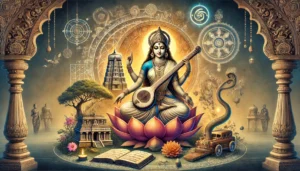
Matangi Devi is a distinctive form of the goddess, often depicted with a dark complexion, sitting serenely on a lotus, surrounded by symbols of creativity and intellect. Her iconography includes the veena (a stringed musical instrument), books, and sometimes parrots, which symbolize eloquence and communication. Unlike the more fearsome goddesses of the Dasha Maha Vidyas, such as Kali or Chinnamasta, Matangi Devi exudes a tranquil energy that is still imbued with great power.
Her Role in Creative Expression and Knowledge
Matangi Devi’s role extends beyond the formal knowledge associated with goddesses like Saraswati. While Saraswati governs structured learning and the disciplined acquisition of knowledge, Matangi Devi represents the more intuitive, informal, and everyday wisdom. Her energy allows for freedom of expression, making her especially appealing to those in creative fields such as writing, music, poetry, and art. She embodies the kind of knowledge that flows naturally in conversations, improvisations, and creative endeavors that are unbound by rules.
How Matangi Devi Unlocks Creative Potential
For artists, musicians, and writers, Matangi Devi’s blessings are transformative. She unlocks the creative potential that lies dormant in individuals, allowing them to express themselves freely and powerfully. Her energy helps remove mental blocks, enabling creators to channel their artistic impulses more effectively. Musicians often invoke Matangi Devi to help them perfect their craft, while writers and poets seek her blessings for eloquence and originality in their work.
The Significance of Her Dark Complexion
In Hindu iconography, a goddess’s complexion is often symbolic of her powers. Matangi Devi’s dark skin signifies her connection to the earth and the material world, where creativity and communication flourish. Unlike the bright, luminous goddesses associated with higher planes of existence, Matangi Devi’s dark complexion reflects her accessibility and willingness to engage with the untamed, unrefined aspects of reality—those elements that are central to art and music. She embraces imperfections and raw creativity, making her the perfect goddess for those who express themselves through spontaneity and improvisation.
The Connection Between Matangi Devi and Creativity, Speech, and Music
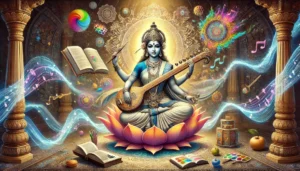
Matangi Devi’s blessings are closely tied to the spoken word and communication in all its forms, from casual conversations to profound philosophical discourse. This connection is what makes her particularly powerful for those involved in communication-based professions, whether they are teachers, public speakers, writers, or musicians.
Matangi Devi as the Goddess of Speech and Communication
Known as Vak Devi, Matangi Devi rules over Vak (speech), which in the Vedic tradition is considered one of the most powerful forms of energy. Speech is not merely a tool for communication, but a way to manifest reality. The words we speak carry power, and Matangi Devi, as the goddess of speech, bestows upon her devotees the ability to use language effectively. Whether it’s influencing others, expressing complex ideas, or creating art, Matangi Devi’s presence ensures that the spoken word resonates with clarity and impact.
Matangi Devi’s Musical Symbolism
Matangi Devi’s veena is more than just a symbol of music; it represents the harmony and rhythm that permeate all of existence. Music is an auditory representation of the divine, and through the veena, Matangi Devi’s energy manifests in the vibrations of sound. Devotees who seek to enhance their musical abilities often invoke Matangi Devi, as she helps them connect with the divine nature of sound. Musicians, singers, and composers come to her to find inspiration, new rhythms, and melodies that speak to the soul.
Matangi Devi and the Mystical Letters: Matrikas
Matangi Devi is also associated with the Matrikas, the mystical letters of the alphabet that are said to contain the essence of the universe. Each letter is a vibration of cosmic energy, and Matangi Devi governs the use of these sounds in communication and creative expression. This is why she is often invoked through mantras, which are carefully composed combinations of sounds that create specific effects when chanted. Worshippers of Matangi Devi find that they develop a deeper understanding of language, grammar, and poetry, enabling them to articulate their thoughts in more meaningful and effective ways.
How Matangi Devi Differs from Other Dasha Maha Vidyas
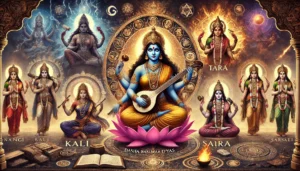
The Dasha Maha Vidyas, or the Ten Great Wisdom Goddesses, represent different aspects of divine power, each with its own unique focus and energy. Among these powerful goddesses, Matangi Devi’s role is distinctly intellectual and creative, setting her apart from the others.
Kali vs. Matangi Devi: Destruction vs. Creation
While Kali is the goddess of destruction and transformation, Matangi Devi operates in a more constructive realm. Kali’s role is to tear down old forms to make way for new ones, but Matangi is the goddess who helps build and express those new forms, particularly in the realms of thought, music, and art. Where Kali’s energy is fierce and uncompromising, Matangi’s energy is gentle yet deeply transformative in a subtle, internal way.
Matangi vs. Tara: Wisdom Through Language
Another powerful comparison is between Tara and Matangi. Tara, the goddess of guidance and protection, helps devotees navigate through life’s difficulties, offering wisdom for overcoming obstacles. Matangi, on the other hand, focuses on wisdom through language and communication. While Tara is often called upon for survival and protection, Matangi is invoked when one seeks to create, express, or articulate ideas. This makes her particularly useful for intellectuals, communicators, and those seeking to master the subtle art of persuasion.
Matangi vs. Saraswati: Formal Knowledge vs. Intuitive Wisdom
Matangi’s role is often compared to that of Saraswati, another goddess associated with learning and the arts. However, while Saraswati represents formal education and scholarly pursuits, Matangi embodies informal, intuitive wisdom. She governs the everyday brilliance of language—casual conversations, poetic improvisation, and spontaneous artistic expression—that Saraswati does not always cover. Therefore, while Saraswati might bless one with academic success, Matangi helps one excel in creative and spontaneous expression.
Temples of Matangi: Sacred Spaces of Wisdom and Creativity

While temples dedicated to Matangi are not as numerous as those dedicated to more widely known goddesses, the few that do exist are considered highly sacred by her devotees. These temples serve as spiritual hubs for those seeking to enhance their communication, unlock their creative potential, and gain profound wisdom. One of the most famous Matangi temples is located in Kanchipuram, a city known for its rich spiritual history.
The Matangi Temple in Kanchipuram
The Matangi Temple in Kanchipuram, Tamil Nadu, is one of the most significant temples dedicated to this goddess. Kanchipuram, often referred to as the City of Temples, is a major spiritual center in South India. The Matangi Temple here attracts thousands of devotees, particularly those involved in artistic and scholarly pursuits, who come seeking the goddess’s blessings for creativity and intellectual excellence.
The Spiritual Atmosphere of Kanchipuram
Kanchipuram has long been a center for tantric and Vedic practices, and the energy of the city is said to be highly conducive to spiritual growth. Matangi’s temple is considered a place where her devotees can immerse themselves in her energy and connect with their inner creative forces. Visitors to the temple often perform special pujas (rituals) and sadhanas aimed at enhancing their communication skills, creative abilities, and intellectual capacity.
Other Notable Matangi Temples
In addition to the temple in Kanchipuram, other notable Matangi temples can be found in parts of Assam and Orissa, regions known for their tantric traditions. These temples are often less formal than larger shrines and are frequented by artists, poets, and musicians who seek Matangi’s guidance in their creative endeavors.
Matangi Devi Sadhana: Tantric Practices for Wisdom and Creativity
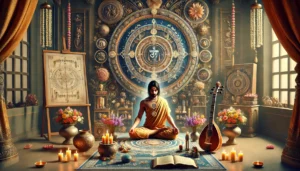
One of the most powerful ways to connect with Matangi is through the practice of Matangi Sadhana, a tantric ritual that invokes her divine presence and blessings. This sadhana is particularly effective for those looking to master communication, enhance creativity, and gain deeper intellectual insights.
Key Elements of Matangi Sadhana
Matangi Sadhana involves several key components, each of which plays an important role in awakening the goddess’s energy within the practitioner.
Mantra Chanting
The core of Matangi Sadhana is the chanting of her mantras. Mantras are sacred sound vibrations that invoke the goddess’s energy. The most commonly recited mantra for Matangi is:
ॐ ह्रीं ॐ ह्रौं ह्रीं मतङ्ग्यै नमः।
“Om Hreem Om Hroum Hreem Matangyai Namah”
This mantra is believed to open up channels of communication within the practitioner’s mind, allowing for clearer thought, enhanced creativity, and improved speech.
Yantra Worship
In tantric traditions, a yantra is a geometric diagram that represents the goddess’s energy. During Matangi Sadhana, practitioners often meditate on the Matangi Yantra, visualizing her presence and reciting her mantras. The yantra acts as a focal point for concentration and helps deepen the connection to Matangi’s energy.
Meditation and Visualization
Practitioners meditate on the image of Matangi, focusing on her serene form as they visualize her blessings entering their minds and bodies. A common practice is to meditate on the throat chakra (Vishuddha Chakra), which governs communication, speech, and self-expression. By focusing on this chakra, practitioners aim to enhance their ability to articulate thoughts clearly and creatively.
Offerings
Matangi is known to accept unconventional offerings, such as leftovers or impure substances, symbolizing her association with the raw, untamed aspects of communication and creativity. These offerings represent the unrefined nature of speech and thought, which Matangi helps to elevate and purify.
Results of Matangi Sadhana
Regular practice of Matangi Sadhana can result in profound spiritual and practical benefits, including:
- Mastery of speech and communication: Whether in casual conversations or public speaking, Matangi blesses her devotees with clarity and persuasive power.
- Enhanced creativity: Writers, musicians, and artists often find that their creative abilities flourish under Matangi’s influence, with ideas flowing more freely and inspiration striking more often.
- Deeper intellectual insight: Matangi’s wisdom can lead to breakthroughs in understanding complex ideas and gaining wisdom beyond formal education.
- Improved relationships: As communication improves, so do interpersonal relationships, as practitioners find it easier to express their thoughts and feelings effectively.
Why Matangi Temples Are Sacred for Wisdom Seekers and Artists
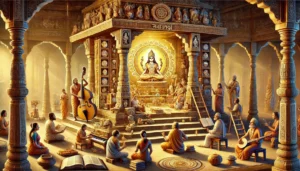
For those seeking to enhance their creative and intellectual abilities, visiting a Matangi temple can be a life-changing experience. These temples serve as powerful spiritual centers where the goddess’s energy is particularly accessible. Whether you are a scholar, artist, musician, or simply someone looking to improve your communication skills, Matangi temples provide the ideal environment for personal and spiritual growth.
The Energy of the Sacred Space
Matangi temples are located in spiritually significant areas where the goddess’s energy is more potent. Devotees often describe feeling a sense of clarity and inspiration after spending time in these sacred spaces. Many visitors come specifically to overcome creative blocks or to find new ideas and insights.
Collective Spiritual Practices
At Matangi temples, group sadhanas are frequently performed, where the collective energy of devotees helps to amplify individual efforts. These group rituals are especially useful for those experiencing creative stagnation or struggling with intellectual pursuits, as the combined focus on Matangi’s energy can unlock new pathways of thought and creativity.
Blessings for Artistic Mastery
Many musicians, artists, and writers make regular pilgrimages to Matangi temples to seek the goddess’s blessings for artistic mastery. Matangi’s role as the deity of the arts makes her particularly appealing to those in creative professions. Whether it’s mastering a new instrument, writing a novel, or creating visual art, Matangi’s blessings can help elevate one’s craft to new heights.
Tantric Rituals for Communication
The tantric rituals performed at Matangi temples often focus on improving speech and communication. For those whose work revolves around the use of language—whether in teaching, writing, public speaking, or performing—these rituals can help develop a more profound and effective command of language.
Unlocking Creativity and Wisdom Through Matangi Worship
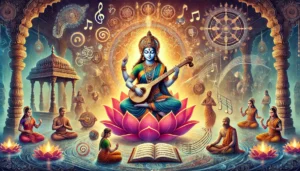
Worshipping Matangi, whether through sadhanas or temple visits, is a powerful way to unlock your creative potential and enhance your intellectual abilities. By connecting with the goddess of wisdom, knowledge, and the arts, you can open yourself to a new level of communication mastery, artistic excellence, and profound wisdom.
Whether you are an artist seeking inspiration, a speaker looking to improve your eloquence, or simply someone on a path toward greater knowledge, Matangi offers the key to unlocking your highest potential.
FAQ
1. Who is Matangi, and how is she different from other goddesses?
Matangi is one of the Dasha Maha Vidyas, the ten wisdom goddesses in tantric tradition. She is the goddess of speech, wisdom, knowledge, music, and the arts. Unlike other goddesses, her power focuses on creative expression, language, and communication, setting her apart from more fearsome goddesses like Kali, who represents destruction, or Tara, who is a protector.
2. What is Matangi Sadhana?
Matangi Sadhana is a tantric ritual practice that involves chanting mantras, worshipping the Matangi Yantra, and meditating on the goddess. The purpose of the sadhana is to gain mastery over speech, enhance creativity, and deepen intellectual wisdom. Regular practice brings profound benefits such as clearer communication, artistic breakthroughs, and intellectual insights.
3. Where are Matangi temples located?
One of the most famous Matangi temples is located in Kanchipuram, Tamil Nadu, a city renowned for its spiritual history. Other notable temples can be found in Assam and Orissa, particularly in areas known for their tantric traditions. These temples attract devotees, especially artists, musicians, and scholars seeking the goddess’s blessings.
4. What benefits can I gain from worshipping Matangi?
Worshipping Matangi can lead to several benefits, including enhanced creativity, improved communication skills, and deeper intellectual insight. Artists, writers, and musicians often find that Matangi helps them unlock new ideas and inspiration, while public speakers and scholars experience greater clarity in expressing complex thoughts.
5. Why is Matangi associated with unconventional offerings?
Matangi is known to accept unconventional offerings, such as leftovers or impure substances, which symbolize her association with the untamed and raw aspects of communication and creativity. This highlights her ability to elevate and refine imperfect or unpolished expressions, making her a unique goddess who embraces spontaneity and freedom in speech and art.


















